Debut of the Month: A SOLDIER'S PLAY's Nnamdi Asomugha Marches Into His Broadway Debut
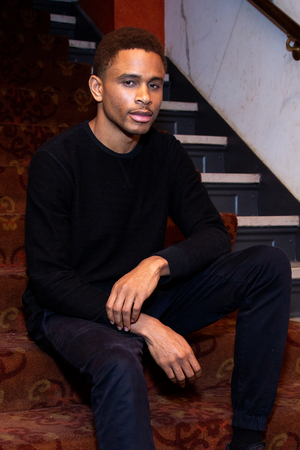
Nnamdi Asomugha, a former All-Pro NFL star turned dramatic actor, makes his Broadway debut as Private First Class Melvin Peterson in Charles Fuller's Pulitzer-prize winning drama, A SOLDIER'S PLAY. Set in a Louisiana Army base in 1944, the gripping murder mystery explores the complicated themes of sacrifice, service, and identity in America. Today, Asomugha speaks with BroadwayWorld and shares his tenacious journey from the football field to the Broadway stage.
[NOTE: BroadwayWorld's fabulous photographer Jennifer Broski captures images of the Broadway stars profiled in our monthly column in a special photo shoot. Check out the pics of Nnamdi Asomugha throughout the feature!]
Congratulations on the success of the show! I understand that you were intrigued by acting from a very young age.
Yes, intrigued might be the word. I always had a great respect for the business of acting and filmmaking and theater, but I never imagined that that would be a career choice for me. That was not until about halfway through my NFL career that I even thought that that could be possible. I didn't do the high school plays growing up. Well actually, I did do one play in the fifth grade, we did A Midsummer Night's Dream and I played King Oberon. But that was the extent of my theatre work. But like I said, I was intrigued and I had a great respect for it. The first film that I ever saw as a kid was Who Framed Roger Rabbit, which was part cartoon, part real life. So it really did not seem real to me. But then the second film I saw in the theater, my aunt snuck us in to see Boyz n the Hood, which was a very different film from Who Framed Roger Rabbit. Growing up in L.A. it felt very close to home. I understood what was going on in the film and I remember when I left the theater, the first thing I asked my aunt was, 'Are you sure this wasn't real? Are you sure this is a movie?' Because to me, movies were make-believe, but this one was just so real. And to hear that it was a movie, I remember at that age being very intrigued and being wowed that actors could make believe something and make it feel so real and seem so accurate.
Your breakthrough performance came in the 2017 film Crown Heights, and the following year you made your stage debut in Vineyard Theater's GOOD GRIEF. What were some of the challenges you faced in making that transition from film to live theater?
So many transitions, right? From football to the entertainment world and then the transition from film to theater. There's just so many things to adjust to. Well with film, the camera can really speak to your thoughts. As long as you're dialed in and as honest as possible, the camera is going to take over. It will zoom in when it's a vulnerable moment, it can really pick up on anything. And then of course you also have the editing room where you can put together performances, you're kind of putting together a highlight reel from all of your attempts at it. But on the stage, you're pretty much out there by yourself, there is no camera. So rather than the camera zooming in on those moments, you have to figure out how to fill up the stage and how to fill up the space. You're breathing the same air as the audience, so if you accidentally drop something on the floor, you can't leave it there, you have to pick it up and keep going. I've learned that there are no mistakes on the stage. But I love it. There's just something about it. You're always reaching for that perfect performance and you're just never going to get it. And I love that about theater. You can get to your next show and you suddenly hear a line differently, and you think, 'Oh, that's what that meant. That's how he felt in that moment.' But you didn't realize it until that very moment in that particular show. So you're always discovering - and there's something very exciting about that.
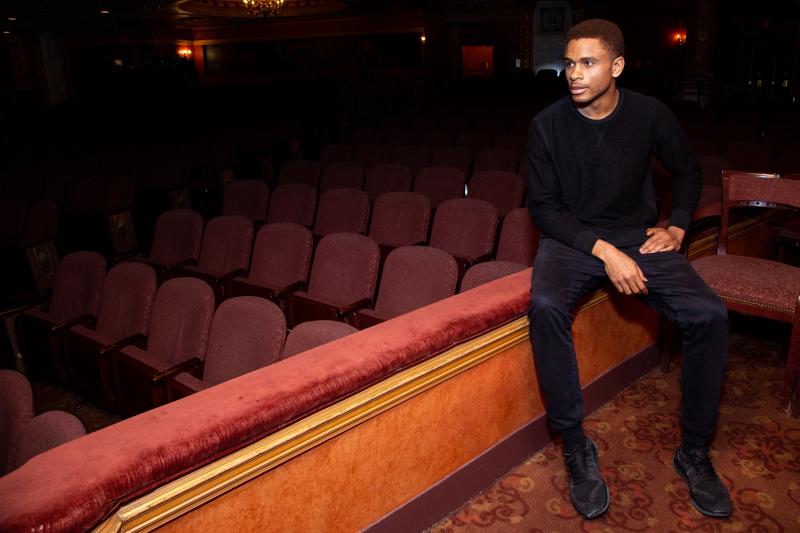
A SOLDIER'S PLAY was written in the early 1980's and takes place in 1944, yet it still feels so relevant today. Why do you think it is striking such a chord with modern audiences?
Well I think that while it is a universal story, the specifics of it are very American, and I think audiences understand that. I think the interracial and the intraracial dynamics in the play are very striking. I think the ideas of race, and power, and fear and the quest for freedom are also very palpable and powerful in this story. And of course, just the way Kenny [Leon] has been able to direct it, he really makes sure to bridge the gap between 1944 and 2020 as much as possible. You know it's there in the words, but the way you direct it can also make it feel very relevant. Kenny found a way to bring in relevant music at the end of the play, and he also incorporated the songs that are heard throughout the play.
Yes, those call-and-response songs and spirituals were very powerful. So they were not part of the original production?
That's correct, they were not in the original production at all. What Kenny wanted to do was really show that it wasn't just about the military. A lot of it was, particularly for African Americans in World War II, a very different level of work. So there are Negro spirituals and different things that Kenny wanted to bring in, especially with the way this particular Sergeant runs the show. And it makes the audience start to wonder, 'Are they getting ready for battle or are they on a plantation? What exactly is going on?' So he wanted to make that connection and underscore the way that Sergeant Waters acts around black people versus the way he acts around white people, and how that contrast can become very tricky amongst the men in the barracks.
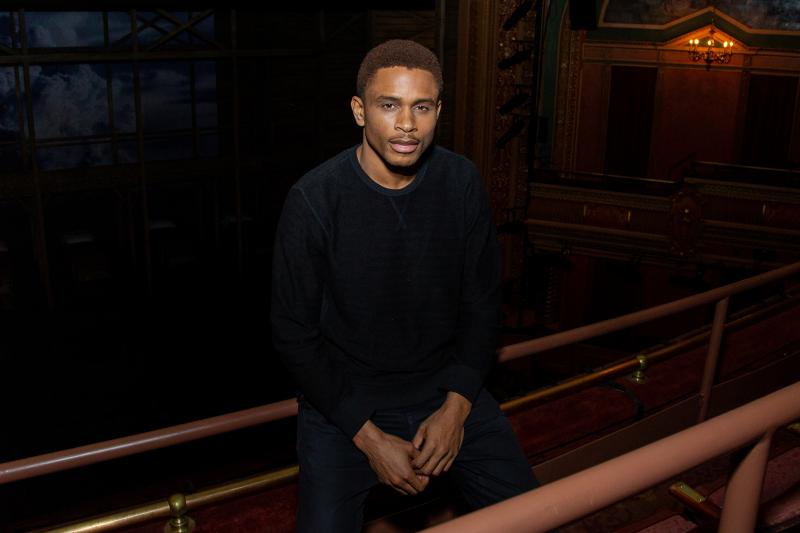
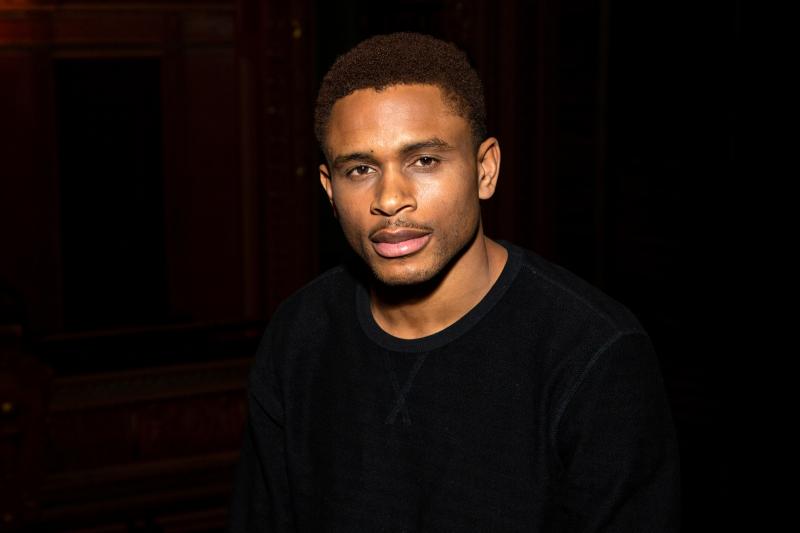
You portray Private First Class Melvin Peterson, and it's interesting to note that you actually share something in common with him as far as where you grew up.
Yes, I was born in Lafayette, Louisiana, but I didn't grow up there. I moved to Los Angeles when I was about three. And one of the first things that Private Peterson says in the play when he's being questioned is that he is from Hollywood, California but by way of Alabama. So that is actually very similar. If you ask me where I'm from I would answer, Los Angeles, California by way of Louisiana. So we are both by way of the South, but we spent enough time in California to feel that that's where we connect to the most. So that is a direct connection that I have with him. And another thing we have common is that he is new to the barracks, he's the guy who just got in. The other guys have been there for a while, they know how things run, they know how the Sergeant is, they know how everything operates. And Peterson is trying to essentially figure it all out and learn who's on his side, and who isn't, what he's supposed to do in certain situations. And that's very much how I feel in the theater world. You know, I'm the new guy compared to everybody else. These guys have been in thirty or forty plays in their lives, and this being my second, I'm still trying to find my footing and find out how things operate. So I can really connect to him with that. So there really are a lot of similarities that I can pull from with this character.
In addition to working with Tony-winning director Kenny Leon, you also share the stage with such theater veterans as David Alan Grier and Blair Underwood. What has that experience been like and what have you learned from them?
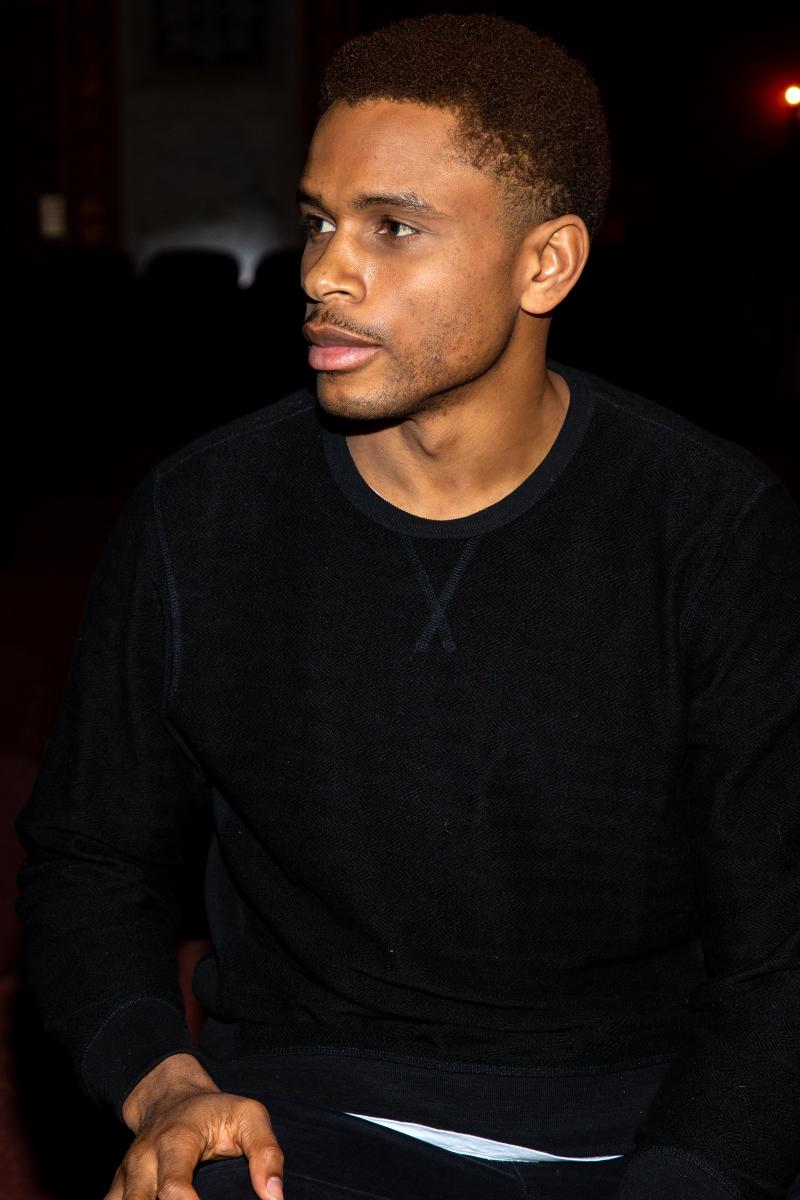 Oh man, I'm attracted to good coaching and these guys have all been good coaches for me. I'm able to flourish with these guys. You know if I'm on stage and I do something that they feel is honest, but they know in a theater, the way that I do it might not be felt, they do not hesitate to tell me, and I welcome that. They'll say,' Oh you know that was great, but you turned over your right shoulder, so in the theater, turn over your left shoulder and you'll connect more with the audience.' It seems like a simple thing, but these are the things that you learn along the way. Obviously you learn that when you''re training in school, but in many ways I'm playing catch up to a lot of the work that these guys have done. So it's been great to have them around and they know that I'm a student, they know that anything they say I'm going to pick up on. I'm just trying to get better and build on my career, so I listen to everything that they say.
Oh man, I'm attracted to good coaching and these guys have all been good coaches for me. I'm able to flourish with these guys. You know if I'm on stage and I do something that they feel is honest, but they know in a theater, the way that I do it might not be felt, they do not hesitate to tell me, and I welcome that. They'll say,' Oh you know that was great, but you turned over your right shoulder, so in the theater, turn over your left shoulder and you'll connect more with the audience.' It seems like a simple thing, but these are the things that you learn along the way. Obviously you learn that when you''re training in school, but in many ways I'm playing catch up to a lot of the work that these guys have done. So it's been great to have them around and they know that I'm a student, they know that anything they say I'm going to pick up on. I'm just trying to get better and build on my career, so I listen to everything that they say.
Like a Master Class in acting.
Yes very much so!
What was it like to make your official Broadway debut in A SOLDIER'S PLAY?
It felt great. The interesting thing was it was probably our 30th show at that point. So for me, the Debut felt like when we did our first dress rehearsal, which was a month ago. But it felt great to be able to talk about the play again in front of the media, and to have Charles Fuller and Douglas Turner Ward show up for that show was very powerful for me. And it's been a great blessing, one of the great blessings of my life. I put in a lot of work and I'm proud to be on this stage that many greats have been on before me and be able to carry that torch.
Making your Broadway debut is not the only exciting thing happening in your career right now. Your next film, Sylvie's Love, which you produced and star in, is premiering at the Sundance Film Festival. Can you tell us a little about that project?
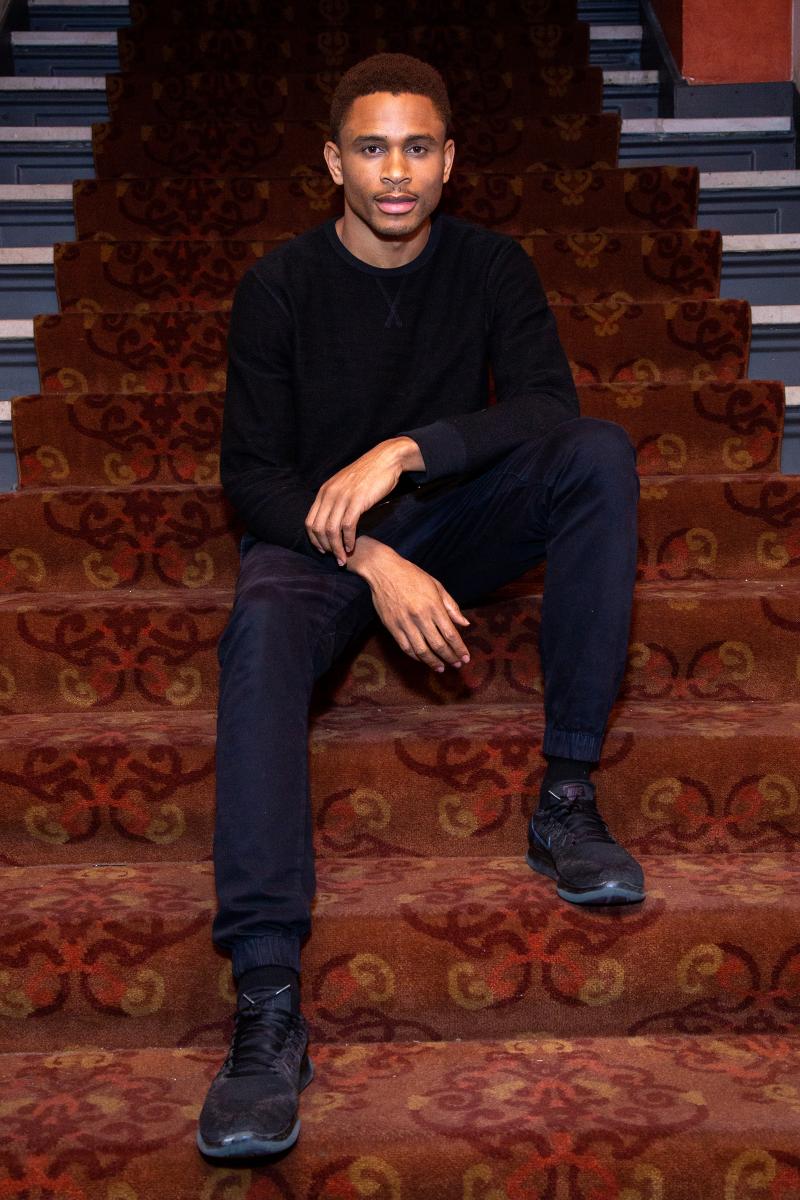 Well it's certainly completely different from A SOLDIER'S PLAY which is very heavy. This is a romantic film about two kids falling in love over a summer in Harlem in 1967 and for one reason or another they break up. And five years later they reconnect and find that their lives have gone separate ways, their careers have gone separate ways, but they realize they still have feelings for each other. So you see them try to navigate those feelings and see if they can go against what the universe is telling them, which is that they should not be together. Yet there is an internal connection that they have and it's really beautiful to watch.
Well it's certainly completely different from A SOLDIER'S PLAY which is very heavy. This is a romantic film about two kids falling in love over a summer in Harlem in 1967 and for one reason or another they break up. And five years later they reconnect and find that their lives have gone separate ways, their careers have gone separate ways, but they realize they still have feelings for each other. So you see them try to navigate those feelings and see if they can go against what the universe is telling them, which is that they should not be together. Yet there is an internal connection that they have and it's really beautiful to watch.
Well congratulations on that and on all your success. It seems like when you put your mind to something you are able to achieve it.
Well I hope so, that's the goal. But it's a lot of hard work, I don't want to downplay the fact that there is a lot of work that goes into it, no matter what it is. You know for guys who have finished playing football, there is some sort of identity crisis I would say, I don't know if that's too strong a word, but you do go through something because you're trying to figure out what's the next thing. You no longer have the 70,000 fans that you run out to and go to work for, or the guys that you go to work with. You suddenly don't have that anymore and you're struggling to figure out what the next thing is. So I feel very lucky and blessed to have found something that I love in the way that I love this work.
BroadwayWorld congratulates Nnamdi Asomugha on his Broadway debut in A SOLDIER'S PLAY! Asomugha is an award-winning actor, producer and former NFL All-Pro. He made his New York stage debut in 2018's Good Grief at Vineyard Theater. On the big screen, his portrayal of Carl King in Crown Heights garnered him both an Independent Spirit Award nomination and an NAACP Image Award nomination for Best Supporting Actor. He will next be seen starring in the feature film Sylvie's Love and serves as producer of Harriet, Beasts of No Nation, The Banker, Crown Heights and Broadway's AMERICAN SON. Before pursuing an acting career, Asomugha played 11 seasons in the National Football League and was one of the best defensive players in the league, receiving multiple All-Pro and Pro Bowl selections.

Videos


